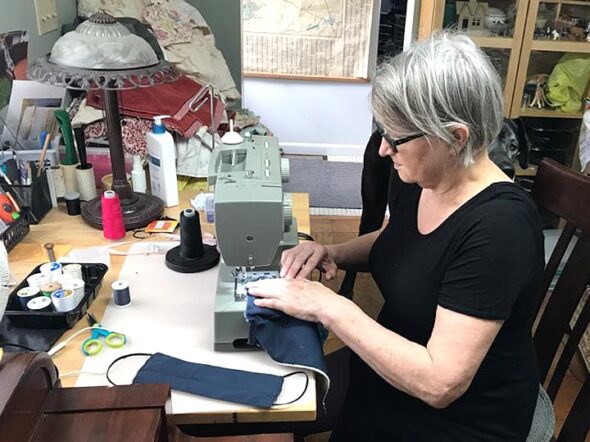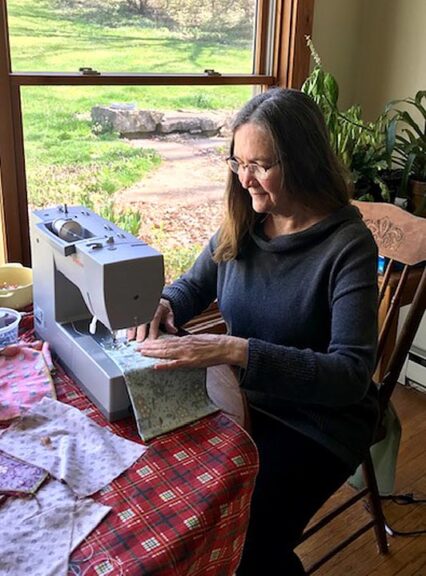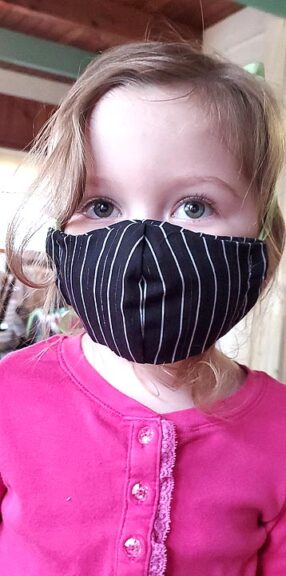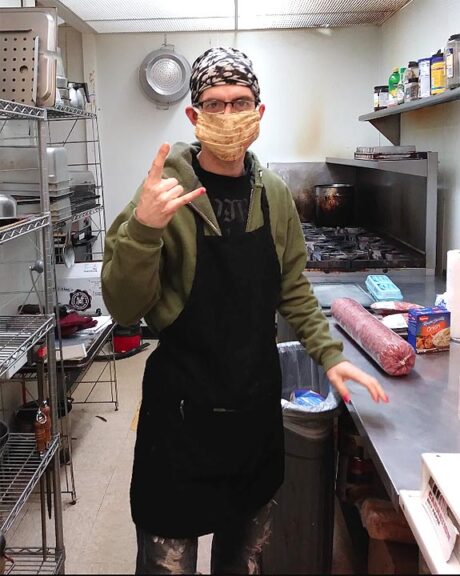
Eve Fleck is hard at work sewing masks for the village’s public-facing workers.
Making masks— Villagers stitch to save lives
- Published: April 9, 2020
On April 3, the Centers for Disease Control and Prevention officially recommended that all people wear cloth face masks or other face coverings when venturing into public places like grocery stores, parks and pharmacies to avoid exposure to the coronavirus that causes COVID-19.
Locally, sewing-machine-wielding villagers have beaten the CDC to the proverbial punch, having already mobilized a large effort to provide face masks for those in the community and surrounding areas who work daily in the village’s public eye. A Facebook group, YS Face Mask Makers, is where many of them congregate virtually to share information and, critically, to identify where need still exists for those who are deemed essential workers.
Kate Hamilton said she was asked to create the Facebook page to unite the individuals and smaller groups who were already working separately. She also volunteered to keep track of those making masks — right now, there are around 35 in her spreadsheet — and where — masks have been delivered. So far, the combined efforts of all the village’s mask-makers have netted around 500 masks delivered to places like doctor’s offices, Friends Care, Tom’s Market and Nipper’s Corner.
“I don’t sew myself, but I have set up my porch as sort of command central,” she said. “So everybody drops things off on my porch — finished masks, materials to share with other people who are sewing, donations for materials.”
“The only mask I’ve sewn is for the lawn gnome on my porch,” she added.
Hamilton said that there’s a sort of hierarchy to the order in which people are receiving masks, with healthcare workers, first responders and public-facing workers at the top, but that each individual mask-maker has also been fulfilling requests from friends and family members to make masks.
“The group wants to focus on donating them to those who need them most, but it’s hard to focus when everybody needs them,” she said. “People are sewing non-stop.”

Chris Powell is hard at work sewing masks for the village’s public-facing workers.
Mask recommendation Reached this week, villager Kirsten Bean of Greene County Public Health explained the importance of wearing a mask.“We know that the coronavirus is spread when people cough or sneeze close to others, even if the person is pre-symptomatic or asymptomatic,” she said. “Therefore, wearing a cloth face mask provides some protection from infecting others and possibly from becoming infected.”
Bean said that wearing face masks may also help deter folks from touching their noses and mouths — other possible avenues of infection — while they’re out in public, potentially coming in contact with surfaces exposed to the coronavirus.
Bean added that cloth face masks are the only protective masks the general public should be wearing at this time, as sterile, disposable masks are in short supply.
“Surgical masks and N95 respirators need to be reserved for our healthcare workers in hospitals who are working with the sickest patients and have the greatest need for personal protective equipment,” she said.

Young Shiloh Deal shows off her brand new face mask.
The CDC has posted its full recommendation on its website, cdc.gov, and points out that face masks should be used in conjunction with current social-distancing measures, not in place of them. The site also advises that cloth face coverings should be machine-washed after use and that people be careful not to touch their eyes, noses and mouths when removing them.
Local mask-making efforts
In cooperation with the other local mask-makers collaborating on Facebook, the YS chapter of Days for Girls, an international nonprofit that makes reusable cloth feminine hygiene products for girls in developing nations, has shifted to making masks during the pandemic. The group has seven mask-makers in its ranks, and between them, they’ve made around 200 masks, according to Chris Powell.
“Days for Girls had to stop all of its regular meetings because we can’t congregate in small spaces,” she said. “The international organization launched the ‘Masks 4 Millions’ project, so now we’re participating in that.”
Powell said that during her time working with Days for Girls, she’s received donations of fabric that were unsuitable to be used on the cloth pads the organization distributes — the organization has stringent guidelines on the types of prints that can be used. She’s now able to use those donated fabrics on masks, and she’s finding a satisfying creative outlet in choosing the fabric and designs.
“Part of the creativity is finding out how to make them work for the individual,” Powell said. “I’ve had fun using cute fabrics for a pediatric doctor’s office, and tweaked designs for healthcare workers who say they prefer a filter pocket or a nosepiece.”
“Actually, I’m about to go on an errand to find navy blue fabric — the police force wants navy blue,” she added.
Katie Rose Wright, another village mask-maker, said that the creative element inherent in the task has been fulfilling for her as well.

Tom’s Market employee Ryan Stinson wears his mask provided to him by volunteer mask-makers.
“I want to make something that is fun-looking as well as well-sewn and helpful,” she said. “I get bored!”
Wright has made around 100 masks herself over the last three weeks. She said she feels a certain amount of stress about the need that still exists, even after such a large personal effort.
“I’ve really learned how to manage my feelings and know when to check in on myself and take a break,” she said. “But every person who’s sewing is overwhelmed with requests. People are starting to feel burned out.”
Hamilton said that until orders are filled for Village workers and others who are out in public every day, there’s no coordinated effort among the mask-makers to sell masks to the general public. When those orders are filled, however, she plans to make a form for the Village website that villagers can use to request a mask. The group is also intending to stock the Little Free Pantry with masks when they can.
“I expect there to be a lot of those requests,” she said. “We might be swamped.”
Powell echoed this sentiment: “I don’t think the number of people sewing can meet the need for the entire community,” she said.
She urged those who aren’t essential workers to make their own masks rather than try to buy them. She recommended the CDC’s pattern for a no-sew mask, which can be made with a large square of fabric — “Use either quilter-grade cotton or T-shirt material,” she said — and rubber bands or elastic hair ties.
There are some mask-makers who are occasionally offering their masks for sale or by donation, with Wright among them. She said that even though she’s making masks primarily for those most at risk, she has provided some for other community members.
“If there’s a stressed-out villager, I’ll let someone pick one up,” she said. “It’s important for people to be safe and it’s important for people’s mental health to feel safe.”
Wright takes donations for masks on a sliding scale — she asks for $5 to $10, or more if folks can afford it, but she’s also accepted non-monetary donations.
“I’ve had people bring me sourdough bread and fresh eggs — somebody just brought me toilet paper!” she said.
Despite the long hours of sewing and the workload that lies ahead, Powell said she feels heartened by all the work that has gone into the community safety effort.
“So many people have talents to share while we’re staying at home, so it makes sense for people to say, ‘OK, what can I do, how can I chip in?” she said. “We are definitely a community that rallies together.”
To read the full recommendation and guidelines from the CDC on face masks, visit http://www.cdc.gov/coronavirus/2019-ncov/prevent-getting-sick/diy-cloth-face-coverings.html; patterns for sewn and no-sew masks are available at this page. To join the volunteer effort to make masks, visit http://www.facebook.com/groups/163328048161810 or contact the YS Community Foundation at yscf@yscf.org or 937-767-2655.
The Yellow Springs News encourages respectful discussion of this article.
You must login to post a comment.
Don't have a login? Register for a free YSNews.com account.











No comments yet for this article.